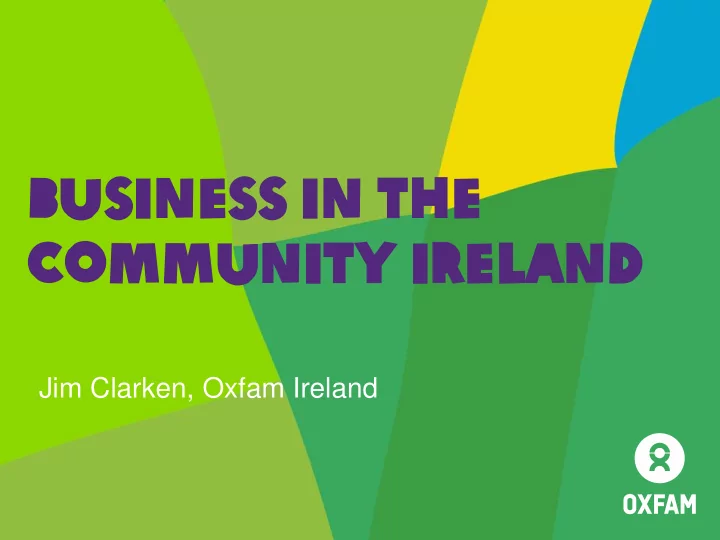

Bus usin ines ess s in in th the e co comm mmuni unity ty Ir Irel eland and Jim Clarken, Oxfam Ireland
SDGs
A safe and just space for humanity
Oxfam’s Engagement with Business Supporting / running companies engaging with existing companies
The captains of the food system
Chocolate and Women • 190,000 pounds – or 86 tons – of chocolate are consumed every second globally. • 5.5 million people producing cocoa for major food and beverages • Rise in sales has not translated in a better life for growers. • Poverty and human rights abuses endemic. Three companies source 40 % of world’s cocoa – imagine what they could do to shift this!
How women fare • Indonesia: Arti* (female, mid- 30’s) • More case studies: https://www.oxfam.org/sites/www.oxfam.or g/files/equality-for-women-starts-with- chocolate-mb-260213.pdf
What companies (didn’t) know and (didn’t) do • How many women work in their supply chain, where and how? • Absence of women issues in only half of sustainability or corporate social responsibility reporting. • Only half of the companies have any projects in place focussing on women economic equality and positive income growth. • No commitment to eliminate discrimination of women throughout their supply chain. • Nestle, Mondelez, and Mars all earned failing scores for their gender policies with scores of just 4, 2 and 1 out of 10 respectively. • Neither Nestle, Mondelez nor Mars has signed onto the UN Women’s Empowerment Principles
Making it matter https://www.youtube.com/watch?v=V5ua_Ny1XVw
Oxfam’s asks • Step One : “Know and show” how women are treated in their value chains. • Step Two : Commit to transparently adopt a “plan of action ” to specifically increase opportunities for women and address inequalities in women’s pay and working conditions along the supply chain. • Step Three : Engage with and influence other powerful and relevant public and private actors to address gender inequality.
Turning 3!
Results in 3 Years • In 2013, Mars, Mondelez, and Nestle committed to signing the UN Women’s Empowerment Principles • By March 2014, Coca-Cola, PepsiCo and Nestle, three of the world’s largest purchasers of sugar committed to taking a “zero tolerance” approach to land grabs. • In August 2014, General Mills and Kellogg agreed to implement industry-leading measures to cut greenhouse gas emissions from its supply chains and press for meaningful political action to address climate change. • Overall, all companies improved their policies over the life of the first three years of the campaign with nine of the ten companies improving their score by at least 10 per cent.
https://www.oxfamamerica.org/static/media/files/coca-cola-sab-miller-poverty- footprint-dec-2011.pdf
The Garment Industry
Meanwhile, we try to fight the race to the bottom
How global business flipped the narrative
Challenges to Businesses • Know, show, commit and act on the SDGs comprehensively. • Reducing inequality is a prerequisite to stop populism and instability – and it should be everyone’s business • Become an advocate for sustainability
Thank you
Recommend
More recommend